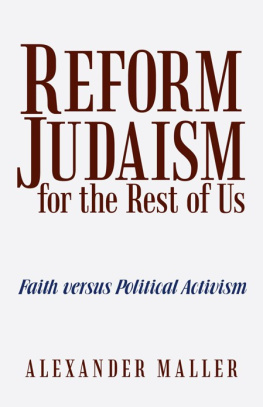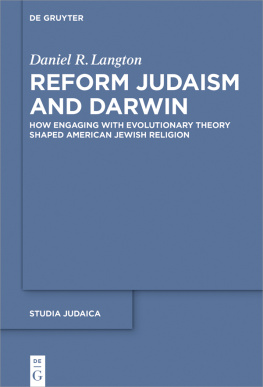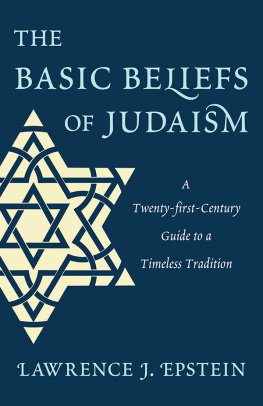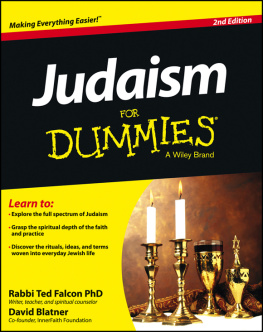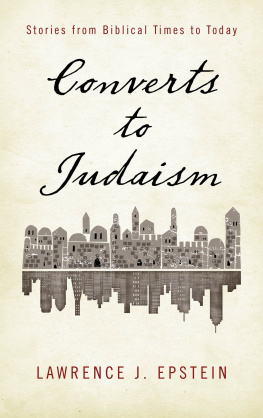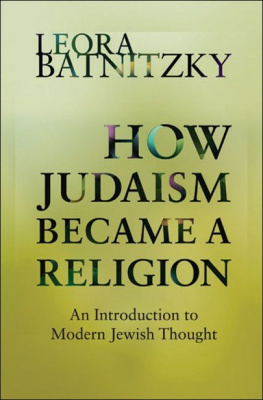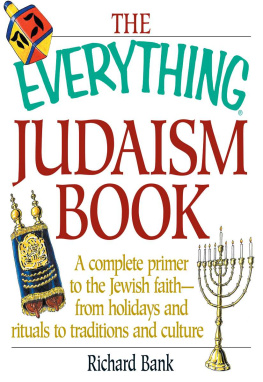Alexander Maller
Reform
Judaism
for the
Rest of Us
Faith versus Political Activism
iUniverse, Inc.
Bloomington
Reform Judaism for the Rest of Us
Faith versus Political Activism
Copyright 2012 by Alexander Maller
All rights reserved. No part of this book may be used or reproduced by any means, graphic, electronic, or mechanical, including photocopying, recording, taping or by any information storage retrieval system without the written permission of the publisher except in the case of brief quotations embodied in critical articles and reviews.
iUniverse books may be ordered through booksellers or by contacting:
iUniverse
1663 Liberty Drive
Bloomington, IN 47403
www.iuniverse.com
1-800-Authors (1-800-288-4677)
Because of the dynamic nature of the Internet, any web addresses or links contained in this book may have changed since publication and may no longer be valid. The views expressed in this work are solely those of the author and do not necessarily reflect the views of the publisher, and the publisher hereby disclaims any responsibility for them.
ISBN: 978-1-4759-3584-4 (sc)
ISBN: 978-1-4759-3583-7 (hc)
ISBN: 978-1-4759-3582-0 (e)
Library of Congress Control Number: 2012912187
iUniverse rev. date: 08/13/2012
Contents
Jewish ReformationThe European Experience:
Enlightenment, Extremism, and Exhaustion
American Reform Judaism:
Trends, Separation, and Hope
Faith in the Almighty or Partners with God?
Pride in the Jewish Heritage:
Particularism versus Universalism
Separation of Church and State:
A Multidimensional Existence
Grassroots Governance
Tikkun Olam? Try Or Goim
Religious ActionIs It Social Action?
Social JusticeIs It Justice for All?
Jewish Family:
The Reform Spirit
Freedom of Education and Reform Education
Beyond Content:
Reform Religious Rituals and Practices
Belonging and the Pursuit of Happiness
The Fraternal Dispute:
Reform Judaism and Zionism
Being a Reform Jew:
The Promises of Hope
Jewish Reform Thriving:
The Reform Galaxy
To my sons.
When inclusion is accomplished, it is done so continuously, or includes the sense of a finished act that is neither the site, the place, nor the point of view, but what remains in point of view, what occupies point of view, and without which point of view would not be. It is necessarily a soul, a subject. A soul always includes what it apprehends from its point of view, in other words, inflection. Inflection is an ideal condition or a virtuality that currently exists only in the soul that envelops it. Thus the soul is what has folds and is full of folds. [22, emphasis in the original] Thus God creates expressive souls only because he creates the world that they express by including it: from inflection to inclusion. 26
Gilles Deleuze, The Fold: Leibniz and the Baroque
I am a new convert to Reform Judaism. Becoming involved in the American Jewish experience led me to discover American Reform Judaism. Reform Judaism for the Rest of Us brings forward my personal experience in the process of understanding and becoming part of my newly found Jewish faith.
The misleading ideological vagaries that have haunted the spirit of many intellectuals in the twentieth centuryJews in particularhave left many of us confused and frustrated. As a reaction to the tragic events of the last century, many Jews regained their Jewish awareness, and like me, are trying to revive their spiritual confidence by finding inspiration in the Jewish faith. Contemporary Judaism has a rich religious spectrum with many folds. The fold I discovered in America is Reform Judaism: an offspring of the Jewish Enlightenment, a faith that praises an open mind and an entrepreneurial and constructive approach to Judaism, recognizes the need to update religious practices, and promotes the separation between church and state.
While studying the history and opinions of my newfound religion, I became aware that radical individuals and groups that failed to fulfill their secular social agenda in the political arena have high jacked the leadership of the faith. Through convoluted interpretations of scriptures and an emphasis on the guilt of personal success, congregants are persuaded to support radical political causes packaged as religious messages. Much of this political agenda is dominated by failed nineteenth-century European ideologies centered on authoritarian governmental control and intervention. Reform Judaism for the Rest of Us exposes the fallacy of these ideologies and disputes the merit of their inclusion as part of the Reform Judaic faith.
In many ways my life experience is representative of the challenges faced by millions of European Jews in their struggle to survive and find a new spiritual life.
My parents, physicians by profession, resided in Eastern Europe. They lived their life as secular Jews and raised me as a secular Jew. To be a secular Jew appears to be a contradiction in terms, or at least a double affiliation. Being a secular Jew was neither unique nor exceptional in Eastern Europe. Conducting a secular life was the way to be accepted, to participate in the civic life, practice a profession, and build a career. Yet, a secular life did not mean assimilation or conversion to a local state religion. Essentially, the spirit that dominated twentieth-century Europe rejected Jews even when they had assimilated or converted. The militant beliefs of the first half of the centurySoviet socialism and German National Socialismcontinued to use Jews, or people of Jewish origin, as subjects for hate and as scapegoats for the failures of those belief systems. By the end of the century and now into the twenty-first century, long after mass extermination and systematic persecution forced the surviving Jews to leave most European countries, the continent, virtually Judenrein (cleansed of Jews), is still showing perverse expressions of anti-Semitism.
Thanks to my mothers courage and wits, my parents survived the Holocaust. I was born toward the end of the Second World War and grew up in Romania in the 1950s. For us to survive in the Socialist paradise, we had to act as loyal followers of the state-imposed Marxist-Stalinist idolatry. Still, we went to synagogue twice a year, on Passover and on Yom Kippur, and we fasted on Yom Kippur. As a child, I did not understand much of the meaning of the rituals except for the fact that they established my identity. This identity instilled in me the hope that one day we might immigrate to Israel. In their youth, my parents did not have a Zionist orientation. Some of our relatives, however, did have a Zionist inclination and managed to move early on to Israel.
Like millions in Eastern Europe at the time, we loathed the Communist spiritual and physical oppression, its incompetence and corruption, its arbitrary control of our life through various regulations applied at the discretion of the partys bureaucracy. The governments vast propaganda machine expected us to believe in an ever-receding utopian future, while imposing, in the name of progress and our own good, more and more restrictions on our current life. The ultimate hypocrisy was that both the party and the public were fully aware of this big lie. To ensure their control of the population, the agents of the regime provoked attempts to criticize the regime and then immediately isolated critics and accused them of treason and other crimes. This simple method enabled the regime to impose deep mass fear and terror to which even children adapted at an early age.
In the late 1950s, through a fortunate congruence of circumstancesand once again, my mothers couragewe were able to narrowly escape Romania for Israel. We could not believe our luck until we actually landed in Vienna, Austria.
Next page
